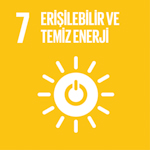Hakkımızda
Metrikler
The ETA Ship and Energy Research Group (ESER)
was established in 2017 at Yıldız Technical University, Naval Architecture and
Maritime Faculty to conduct fundamental and applied research on internal
combustion engines. Currently, the group includes 1 Assoc. Prof., 3 Asst. Prof.
and 4 PhD students and 2 MSc. students. The group facilitate activities in the Engine
Research Laboratory at Naval Architecture and Maritime Faculty.
The Mission of the ESER Group is to provide
basic understanding and vision into combustion processes in Internal Combustion
Engines (ICE) and exploring current challenges contribute to acceleration in
the development of next-generation environmental friendly and high efficient engines.
In addition, research and development of
renewable alternative fuels and technologies serve for sustainability and efficiency
are among the goals of the group. We collaborate with industry to overcome
technical, economic and social barriers in commercial use of alternative fuels.
Advances in ICE has always been achieved by improvements
in tribology. The group has also an outstanding history of experimental
tribology research.
Gas/diesel dual fuel engines offer a way to
meet current and future emission standards at a lower fuel cost. However,
numerous technical challenges remain, requiring a better understanding of
in-cylinder combustion physics. Researching the combustion physics, economy,
sustainability and environmentalism of the Compression Ignition engine
operating with gas fuels (natural gas, syngas, hydrogen…etc.) is another field
of study of the group.
Research on dual fuel ammonia (NH3)/diesel,
NH3/H2 and NH3/dimethyl ether (DME) will also
be carried out by the group. The use of NH3 as a fuel is a
relatively novel concept, especially in dual-fuel applications.
Furthermore, ESER group has a studies about
performance monitoring and evaluation in ships and power plants. In addition, studies
are carried out within the scope of energy efficiency connected to air
pollution and reduction of greenhouse gas emissions in ship main and auxiliary
engines related to Energy Efficiency Operational Index (EEOI) and Carbon Intensity
Indicator (CII).








